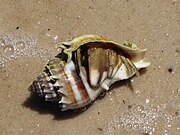Melongena corona
Appearance
| Melongena corona | |
|---|---|

| |
| Scientific classification | |
| Domain: | Eukaryota |
| Kingdom: | Animalia |
| Phylum: | Mollusca |
| Class: | Gastropoda |
| Subclass: | Caenogastropoda |
| Order: | Neogastropoda |
| Family: | Melongenidae |
| Genus: | Melongena |
| Species: | M. corona
|
| Binomial name | |
| Melongena corona (Gmelin, 1791)
| |
| Synonyms[1] | |
| |
Melongena corona, common name the Florida crown conch, is a species of sea snail, a marine gastropod mollusk in the family Melongenidae, the crown conches and their allies.[2]
- Subspecies
- Melongena corona corona (Gmelin, 1791)
- Melongena corona winnerae Petuch, 2003
Description
The shell of this species is extremely variable in terms of the degree of spiny ornamentation. Some shells are much smoother than others. These snails can be as large as about 5 in (12 cm) long, and are mostly dark brown with irregular bands of white or cream. There are small spines on the largest whorl of the smoother forms,; the most spiny forms have several rows of spines. The aperture of the shell can be closed at will with an operculum. This snail is a predator; it eats other mollusks, including scallops.[3]
-
A live Melongena corona rolling over by using its operculum
-
Melongena corona laying eggs.
-
The shell of Melongena corona inhabited by a hermit crab
References
- ^ Masterson, J. (2008). "Smithsonian Marine Station at Fort Pierce". Retrieved 12 January 2010.
- ^ MolluscaBase eds. (2021). MolluscaBase. Melongena corona (Gmelin, 1791). Accessed through: World Register of Marine Species at: http://marinespecies.org/aphia.php?p=taxdetails&id=420061 on 2021-07-11
- ^ Crowned Conch: Dark Invader Retrieved 2011-11-29.
- Tucker, J.K. (1994). The crown conch (Melongena: Melongenidae) in Florida and Alabama with the description of Melongena sprucecreekensis, n. sp. Bulletin of the Florida Museum of Natural History, Biological Sciences. 36: 181–203
- Jensen, R. H.; Pearce, T. A. (2009). Marine Mollusks of Bermuda: Checklist and Bibliography. Delaware Museum of Natural History, Wilmington, Delaware, 473 pp.
External links
- Gmelin J.F. (1791). Vermes. In: Gmelin J.F. (Ed.) Caroli a Linnaei Systema Naturae per Regna Tria Naturae, Ed. 13. Tome 1(6). G.E. Beer, Lipsiae
- Sowerby, G. B., III. (1879). Descriptions of ten new species of shells. Proceedings of the Zoological Society of London. 1878: 795–798, pl. 48
- Clench, W. J.; Turner, R. D. (1956). The family Melongenidae in the western Atlantic. Johnsonia. 3(35): 161–188, pls 94–109
- Pilsbry, H. A. & Vanatta, E. G. (1934). Melongena corona and its races. The Nautilus. 47(4): 117-121, pl. 12
- osenberg, G.; Moretzsohn, F.; García, E. F. (2009). Gastropoda (Mollusca) of the Gulf of Mexico, Pp. 579–699 in: Felder, D.L. and D.K. Camp (eds.), Gulf of Mexico–Origins, Waters, and Biota. Texas A&M Press, College Station, Texas
- Hayes, K. A.; Karl, S. A. (2009). Phylogenetic relationships of crown conchs (Melongena spp.): the corona complex simplified. Journal of Biogeography. 36(1): 28-38.



